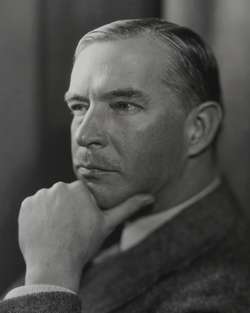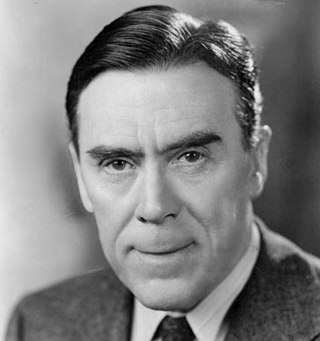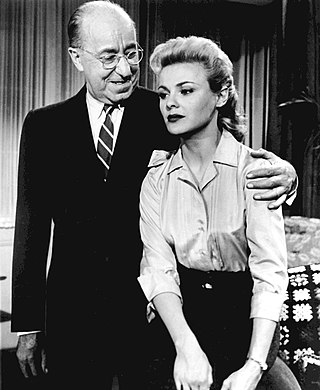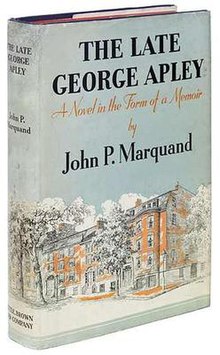
William Robertson Davies was a Canadian novelist, playwright, critic, journalist, and professor. He was one of Canada's best known and most popular authors and one of its most distinguished "men of letters", a term Davies gladly accepted for himself. Davies was the founding Master of Massey College, a graduate residential college associated with the University of Toronto.

Henry Graham Greene was an English writer and journalist regarded by many as one of the leading novelists of the 20th century.

Henry James was an American-British author. He is regarded as a key transitional figure between literary realism and literary modernism, and is considered by many to be among the greatest novelists in the English language. He was the son of Henry James Sr. and the brother of philosopher and psychologist William James and diarist Alice James.

John Phillips Marquand was an American writer. Originally best known for his Mr. Moto spy stories, he achieved popular success and critical respect for his satirical novels, winning a Pulitzer Prize for The Late George Apley in 1938. One of his abiding themes was the confining nature of life in America's upper class and among those who aspired to join it. Marquand treated those whose lives were bound by these unwritten codes with a characteristic mix of respect and satire.

Mr. Moto is a fictional Japanese secret agent created by the American author John P. Marquand. He appeared in six novels by Marquand published between 1935 and 1957. Marquand initially created the character for the Saturday Evening Post, which was seeking stories with an Asian hero after the death of Charlie Chan's creator Earl Derr Biggers.

John Henry O'Hara was one of America's most prolific writers of short stories, credited with helping to invent The New Yorker magazine short story style. He became a best-selling novelist before the age of 30 with Appointment in Samarra and BUtterfield 8. While O'Hara's legacy as a writer is debated, his champions rank him highly among the under-appreciated and unjustly neglected major American writers of the 20th century. Few college students educated after O'Hara's death in 1970 have discovered him, chiefly because he refused to allow his work to be reprinted in anthologies used to teach literature at the college level.

Leo Gratten Carroll was an English actor. In a career of more than 40 years, he appeared in six Hitchcock films including Spellbound, Strangers on a Train and North by Northwest and in three television series, Topper, Going My Way, and The Man from U.N.C.L.E..

Louis Dearborn L'Amour was an American novelist and short story writer. His books consisted primarily of Western novels, though he called his work "frontier stories". His most widely known Western fiction works include Last of the Breed, The Walking Drum, Hondo, Shalako, and the Sackett series. L'Amour also wrote historical fiction, science fiction, non-fiction (Frontier), and poetry and short-story collections. Many of his stories were made into films. His books remain popular and most have gone through multiple printings. At the time of his death, almost all of his 105 existing works were still in print, and he was "one of the world's most popular writers".

Kenneth Lewis Roberts was an American writer of historical novels. He worked first as a journalist, becoming nationally known for his work with the Saturday Evening Post from 1919 to 1928, and then as a popular novelist. Born in Kennebunk, Maine, Roberts specialized in regionalist historical fiction, often writing about his native state and its terrain and also about other upper New England states and scenes. For example, the main characters in Arundel and Rabble in Arms are from Kennebunkport, the main character in Northwest Passage is from Kittery, Maine and has friends in Portsmouth, New Hampshire, and the main character in Oliver Wiswell is from Milton, Massachusetts.

Robert William Speaight was a British actor and writer, and the brother of George Speaight, the puppeteer.

The Glass Key is a novel by American writer Dashiell Hammett. First published as a serial in Black Mask magazine in 1930, it then was collected in 1931. It tells the story of a gambler and racketeer, Ned Beaumont, whose devotion to Paul Madvig, a crooked political boss, leads him to investigate the murder of a local senator's son as a potential gang war brews. Hammett dedicated the novel to his onetime lover Nell Martin.

Philip Ives Dunne was an American screenwriter, film director and producer, who worked prolifically from 1932 until 1965. He spent the majority of his career at 20th Century Fox. He crafted well regarded romantic and historical dramas, usually adapted from another medium. Dunne was a leading Screen Writers Guild organizer and was politically active during the "Hollywood Blacklist" episode of the 1940s–1950s. He is best known for the films How Green Was My Valley (1941), The Ghost and Mrs. Muir (1947), The Robe (1953) and The Agony and the Ecstasy (1965).

Robert Ardrey was an American playwright, screenwriter and science writer perhaps best known for The Territorial Imperative (1966). After a Broadway and Hollywood career, he returned to his academic training in anthropology and the behavioral sciences in the 1950s.

"Every Little Movement (Has a Meaning All Its Own)" is a popular song. Its music was written by Karl Hoschna and its lyrics by Otto Harbach for their musical, Madame Sherry, which opened on Broadway on August 30, 1910. The song was sung in the musical by Frances Demarest and John Reinhard.

David Francis Dodge was an American author of mystery/thriller novels and humorous travel books. His first book was published in 1941. His fiction is characterized by tight plotting, brisk dialogue, memorable and well-defined characters, and often exotic locations. His travel writing documented the adventures and misadventures of the Dodge family as they roamed around the world. Practical advice and information for the traveler on a budget are sprinkled liberally throughout the books.

The 20th Century Fox Hour is an American drama anthology series televised in the United States on CBS from 1955 to 1957. Some of the shows in this series were restored, remastered and shown on the Fox Movie Channel in 2002 under the title Hour of Stars. The season one episode Overnight Haul, starring Richard Conte and Lizabeth Scott, was released in Australia as a feature film.

The novel of manners is a work of fiction that re-creates a social world, conveying with detailed observation the complex of customs, values, and mores of a stratified society. The behavioural conventions (manners) of the society dominate the plot of the story, and characters are differentiated by the degree to which they meet or fail to meet the uniform standard of ideal social behaviour, as established by society.

Think Fast, Mr. Moto is a 1937 American mystery film directed by Norman Foster and featuring a mysterious Japanese detective named Mr. Moto. It is the first of eight films in the Mr. Moto series, all based on the character Mr. Moto created by John P. Marquand. The film stars Peter Lorre as the title character, Virginia Field, Thomas Beck and Sig Ruman. Mr. Moto works to stop a secret smuggling operation.

Joan Chandler was an American actress who notably starred in Rope (1948) with James Stewart and Humoresque (1946) with Joan Crawford.

The Late George Apley is a 1947 American comedy romance film about a stuffy, upper-class Bostonian who is forced to adjust to a changing world. It starred Ronald Colman in the title role and was based on John P. Marquand's novel of the same name and the subsequent play by Marquand and George S. Kaufman.




















